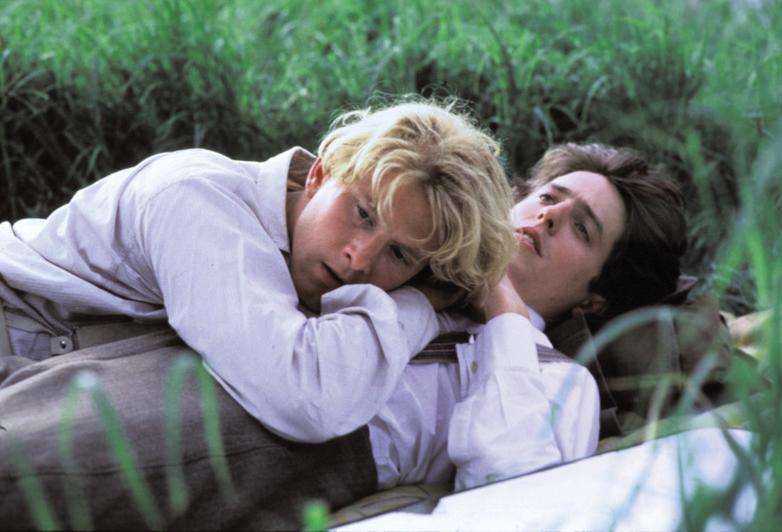




Dir.: James Ivory | Writer: James Ivory, Kit Hesketh-Harvey | Cast: James Wilby, Hugh Grant, Rupert Graves, Phoebe Nicholls, Ben Kingsley, Denham Elliot; UK 1987, 140 min.
James Ivory’s second E.M. Forster adaption (framed by Room with a View and Howards End) is a melancholic gay love story, set in the years before WWI. Forster had written the novel in 1914 (two revisions followed), but it was only published a year after his death in 1971, when homosexual relationships were decriminalised in the UK.
The dazzling drama went on to share a Silver Lion (for Best Director for Ivory) at the Venice Film Festival but the public reception was muted – clearly the subject matter was too avantgarde for mainstream audiences: the time for a feature about gay relationships was still in the future.
At Cambridge in 1909, students Maurice (Wilby) and Clive (Grant) fall in love. Maurice is a romantic dreamer, but Clive is much more pragmatic, and certainly draws the line when it comes to physical contact: his idea of a relationship is strictly platonic. He soon settles into the privileged milieu, focusing on his career as a Tory MP with his timid wife Anne (Nicholls).
Maurice, having been thrown out of Cambridge, becomes a stockbroker in his father’s business, but is still fighting with his gayness. He consults a doctor (Denholm Elliot), who declares him fit for marriage, and a hypnotist (Kingsley) – but he is unable to reconcile his innate feelings. He becomes a regular visitor to Clive and Anne’s estate – just to be near his object of desire – and eventually Maurice falls for a young farmhand Alec Scudder (Graves), who is set to emigrate to Argentina, but soon changes his mind. So Maurice gives up his high society life for true love.
James Ivory wrote Maurice with Kit Hesketh-Harvey, rather than his usual writer Ruth Prawer Jhabvla – and repressed love and class barriers are the central themes. Shot at King’s College Cambridge and Palladian House in Wiltshire, these backgrounds assumed increasing importance as the narrative unfolds. DoP Pierre Lhomme (Camille Claudel, Cyrano de Bergerac) lets the light play over the sunny meadows, misty rivers and majestic stately homes. This is the England of the upper classes; where love, and passion are stifled behind traditional closed doors. There is more excitement during the cricket match than in any of the relationships portrayed: therefore Maurice’s decision is much easier to comprehend. Unable to find satisfaction in his own background, he risks and jeopardises everything for love elsewhere.
Nearly forty years after its premiere, Maurice still has emotional impact: like all true classics, it transcends time, and delivers a portrait of a society very much alive still today: behind the beauty of the exterior, lays the same problem: an England which has very little place for intimacy and passion – even though sex has become an commodity, like everything else. And outside the metropolis, homophobia is still a common currency, together with an increasing xenophobia.
Ivory excels in portraying the beauty and the spiritual emptiness, side by side: E.M. Foster had to hide his sexual orientation until his death at the age of 91, and all of the director’s adaptations of his novels show protagonists hiding and appeasing society in this green and pleasant land. AS
COMING TO BFI PLAYER